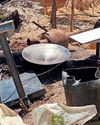
IN A NOTEBOOK, BHOLE NATH SINGH ARMO drew a map of his village. He pointed his pen at the middle to mark the temple where the village deity had lived. To the west, he noted a settlement of more than 200 houses where he, his father and his grandfather were born and raised.
Then, to the north, another temple for a female deity.
This was how his village, Kete, looked until nine years ago, when it was destroyed by a company controlled by a $260bn conglomerate. The conglomerate is named after its owner, Asia's richest man, Gautam Adani.
The village was located in the central Indian state of Chhattisgarh, on the edge of the Hasdeo Arand forest. One of India's few pristine tracts of forest, Hasdeo Arand sprawls across more than 1,500 sq km.
It is home to rare plants, endangered animals, and sal trees so tall they seem to brush against the sky.
The forest also contains an estimated 5bn tonnes of coal, located close to the surface, making it easy to mine. The federal government has divided the region into 23 "coal blocks", six of which it has approved for mining. The Adani Group has bagged the contracts to mine four of those six, including the one that encompasses Kete and adjoining villages. The construction of these mines will destroy at least 1,898 hectares of forest land. The specific coal block under Kete has about 450m tonnes of coal, worth about $5bn.
India is the world's second-largest producer and consumer of coal (after China), and Kete's story is like others across the country. In 1998 it was calculated that more than 2.5 million Indians had been displaced by mining projects since 1950; many more will have been displaced since. The coal sector generates about 70% of the country's annual electricity and employs at least 2.9 million people. While India has pledged to reduce its carbon emissions by 45% below 2005 levels by 2030, it has no plans to phase out coal.
This story is from the January 06, 2023 edition of The Guardian Weekly.
Start your 7-day Magzter GOLD free trial to access thousands of curated premium stories, and 9,000+ magazines and newspapers.
Already a subscriber ? Sign In
This story is from the January 06, 2023 edition of The Guardian Weekly.
Start your 7-day Magzter GOLD free trial to access thousands of curated premium stories, and 9,000+ magazines and newspapers.
Already a subscriber? Sign In

Starlink's conquest of the Amazon leaves Brazil in a dilemma
The helicopter swooped into one of the most inaccessible corners of the Amazon rainforest. Brazilian special forces commandos leaped from it into the caiman-inhabited waters below.

Dalai Lama's mountain town feels the strain of tourist boom
SUVs and saloon cars pass slowly along McLeod Ganj's narrow one-way Jogiwara Road, blaring horns at pedestrians and scooter riders and playing loud music.

'I am all the world' The brutal rule of a West Bank settler
Palestinians tell ofblacklisted Yakov's reign across the Jabal Salman valley and heisjust one of many violent bosses

Stormy waters New flashpoint emerges in South China Sea dispute
Hopes that tensions in the South China Sea might ease have been short lived.

'Justice delayed' Why trust in public inquiries to bring closure is fading
After the final report of the Grenfell fire inquiry was published, Hisam Choucair, who lost six family members in the blaze, said: \"We did not ask for this inquiry... It's delayed the justice my family deserves.\"

Celeriac soup with almond pangrattato
I'm not ashamed to say that as soon as September hits, my stick blender comes out. Just as I embrace salads when the clocks go forward in the UK, I wholeheartedly throw myself into soup season once the summer holidays end. Autumn is approaching in the northern hemisphere and I'm ready with my ladle. Celeriac is one of my favourite soup heroes, because it gives the creamiest, silkiest finish with little effort. You don't have to make the almond pangrattato, but it is a wonderful addition.

Are smoke signals telling me to make an oil change in the kitchen?
Should you that is, not can you) cook with extra-virgin olive oil? Antonio, Atlanta, Georgia, US

Going underground
A darkly humorous encounter between an American spy-cop and the members ofan eco-commune she is hired to infiltrate

All work and no play
Hard Graft, a powerfulnew London exhibition, focuses onworkers’ exploitation, from the ruined hands ofa washerwoman to mothers forced to sell their bodies

What the princess and the shaman tell us about hereditary privilege
It should have been an Instagram-perfect wedding image, but it turned out to be something more embarrassing.